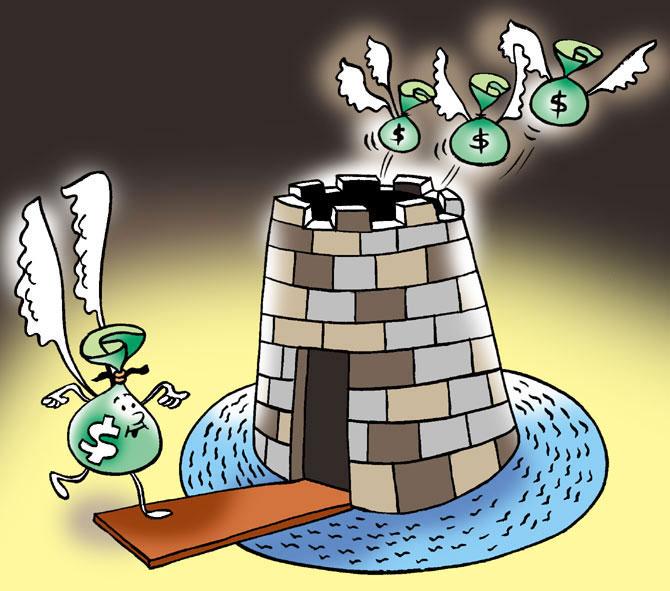Depreciating the rupee against the dollar to boost economic growth has fiscal constraints and monetary limitations
Illustration: Uttam Ghosh/Rediff.com

Given the resource crunch of the Centre and the states as well as the limitations of monetary policy tools, depreciating the rupee against the dollar to boost economic growth, which fell to 5.7 per cent in the April-June quarter, is an idea that has found favour among economists.
The idea had been broached by former chief economic advisor Shankar Acharya.
However, the economists say it could be just a limited option. The problem of rupee liquidity will arise if the Reserve Bank of India (RBI) buys dollars.
Some others suggested that the central bank had been purchasing dollars, but this had not stopped the dollar from depreciating because of some external factors.
Others want growth to come through fiscal expansion rather than by tweaking the exchange rate because the latter is seen as a limited tool.
Acharya’s prescription is not only to boost exports but also import-competing domestic production. But has the government not stopped the policy of import substitution?
To this query, the former chief economic adviser said it was only selective import substitution that had been done away with.
When told that the RBI’s stated policy was to intervene only when there was volatility in the exchange market, Acharya said it was difficult to define what volatility was. In fact, that gave room to intervene in the market, he said.
Soumya Kanti Ghosh, chief economist with the State Bank of India group, said tweaking exchange rates would give only a limited push to the economy.
He said inflation targeting had its pitfalls because it appreciated currencies not only in India but worldwide.
Depreciating the rupee would work against inflation targeting, he said. He said the government should rather go for fiscal expansion and capital expenditure.
It should do it this year because next year there would be a pre-election Budget, in which more focus might be laid on social welfare schemes, he said.
He said the government should pursue this policy even if the fiscal deficit breached the target of 3.2 per cent of gross domestic product (GDP).
The deficit has reached 92 per cent of the Budget target in four months.
Also, the government could pursue fiscal expansion without resorting to market borrowing because it could use short-term treasury bills, a practice it pursued last year.
Devendra Pant, chief economist, Icra, said the policy could be pursued but it had its own costs.
Buying of dollars by the RBI will increase rupee liquidity, for which market stabilisation schemes or the standing deposit facility is required and the interest rate on such absorption should be lower than the reverse repo rate.
Besides, boosting economic activity through the exchange rate depends on how strong the global demand for the country’s exports is.
The share of exports in GDP, after having adjusted for inflation, declined to 19.4 per cent in the first quarter of the current financial year from 20.2 per cent in the year-ago period.
Domestic production has problems, which could get only a limited boost from exchange rate tweaking, Pant said.
Besides, intervention has to be not only against the dollar but competing currencies such as the Chinese yuan, according to him.
Aditi Nayar, principal economist with Icra, said the data released by the RBI indicated that it had been intervening in the spot and forward markets, and made a spot purchase of more than $11 billion in April-July 2017.
She said stemming foreign portfolio inflows (FPI) might reduce the appreciating trend of the rupee.
This could be done in debt markets.
A modest rise in the corporate debt limit for FPIs would restrict the magnitude of inflows in the coming months, she said.
The RBI is likely to announce a hike in the foreign portfolio investment limit in corporate bonds by around $2 billion from the current $51 billion.
According to the website of National Securities Depository Ltd, 99.2 per cent of the $51 billion cap has been utilised as of September 15.
According to sources, the RBI has told experts that it has been intervening in the market and is willing to do so in keeping with the movement in the dollar index.
The central bank, according to sources, said it did not want to intervene more. There is always the risk of getting the label of being a currency manipulator, which the RBI does not want, sources say.
It also expressed reluctance to intervene to alter the rupee value against the yuan because the neighbouring country can use capital controls to change the value of its currency.












